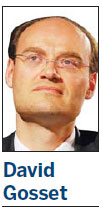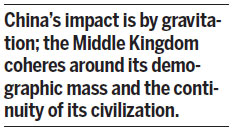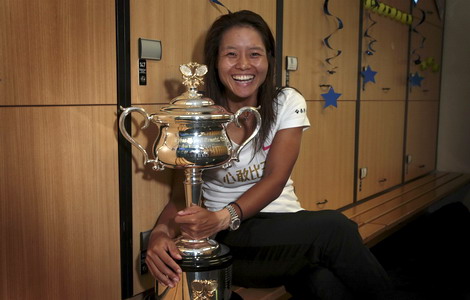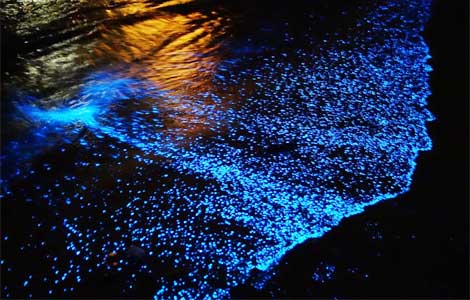Grandeur and centrality
Updated: 2014-01-24 08:52
By David Gosset (China Daily Europe)
|
|||||||||||
France and China, which are celebrating 50 years of diplomatic relations, have long had a clear view of their identities
A statement is repeatedly attributed to Napoleon Bonaparte that he probably never uttered and that has become an inept cliche: "When China awakes, the world will shake."
At a news conference on Sept 9, 1965, the French president Charles de Gaulle presented a more nuanced view: "A fact of considerable significance is at work and is reshaping the world: China's very deep transformation puts it in a position to have a leading global role."
Time has confirmed de Gaulle's prediction, the Chinese renaissance modifying the global distribution of power in a gradual and peaceful process without any abrupt discontinuity or violent disruption.
On Jan 27, three days before the beginning of the Year of the Horse, the 50th anniversary of the establishment of diplomatic relations between France and the People's Republic of China will be celebrated. From a French perspective, the full recognition of Beijing's government was, above all, the decision of one man, de Gaulle, one of France's greatest statesmen and a colossus of 20th century politics.

Days after the 1964 announcement, Time magazine commented on the new state of affairs in a report on French diplomacy from Richelieu to de Gaulle that gave a sense of the global echo and significance of the Gaullist breakthrough. "As a nation, France has seemed to be dying all through the 20th century Yet last week the impossible had apparently come true, and France was once more a mover and shaker in world affairs ... To cap his nation's re-emergence as a world power, de Gaulle recognized the Communist regime in Beijing as the government of China, brushing aside protests from Washington that the move would seriously damage US policy in Asia."
In the geopolitical context of the 1960s, de Gaulle's judgment on China was visionary and an illustration of his ability to discern fundamental historical trends. His acumen and strategic thinking were not only at the heart of a special relationship between Paris and Beijing, but the spirit of his groundbreaking decision remains a point of reference for Sino-French cooperation.
Only members of the Soviet bloc immediately recognized the new Chinese regime in 1949. Although Sweden, Denmark, Switzerland, Liechtenstein and Britain established relations with China one year after Mao Zedong had proclaimed the birth of the People's Republic, France was the first of the major Western countries to opt for diplomatic relations with Beijing at the ambassadorial level.
When Lucien Paye, who had been minister of education, arrived in Beijing on May 27, 1964 as de Gaulle's first ambassador in China, the 15-year-old People's Republic was not only in an ideological battle against the US-led Western world, but was also at odds with its two gigantic neighbors, India and the Soviet Union.
The US president, Lyndon Johnson, a Democrat, adhered to a policy of systematic containment and actively supported the massive US military intervention in Vietnam to stop the feared expansion of Communism. In 1962 India clashed with the People's Liberation Army in border disputes in the Himalayas, and in another sign of a Sino-Soviet split, Nikita Khrushchev tended to back Jawaharlal Nehru in his complex relations with China.
Because of the preeminent position of the US in the global order after World War II, president Richard Nixon's opening to Beijing in the 1970s was a geopolitical watershed of the highest importance. Commentators often expound on the US triangular diplomacy that used the options offered by the rivalries between Beijing and Moscow, an ironic US application of the Chinese strategy of "using the foreigners to subdue the foreigners" - yi yi zhi yi.
The then US secretary of state Henry Kissinger conceived and masterfully orchestrated this foreign policy shift, but in his book Diplomacy in 1994 he acknowledged de Gaulle's foresight: "Interestingly enough, the leader who had first perceived the opportunities inherent in a Sino-Soviet split was the old man of European diplomacy, de Gaulle." But, regrettably, Kissinger chose to ignore in his more recent On China (2011) the pioneering role Gaullian France played, as if he wishes to be remembered with the passage of time as the original trailblazer.
In circumstances that would have deterred less confident characters, de Gaulle demonstrated his sound resolution, and in the Elysee Palace on Jan 31, 1964, he explained his decision to recognize Beijing in a news conference.
He aired his thoughts on China, but it was also a memorable moment of Gaullian dramaturgy, described in these terms by the Time writer: "More than 1,000 newsmen, diplomats and officials were perched anxiously on a sea of spindly gold chairs when at the stroke of 3 pm the raspberry-red curtains parted and de Gaulle lumbered to the podium."
The theatrical appearance should not distract from the rich content of de Gaulle's presentation. His reasoning was solidly based upon two pillars that are also two distinctive features of Gaullism: a long-term view and an effort to take into account, beyond transitory events, more permanent realities.
De Gaulle began his conference with demographic and geographic facts. "The great Chinese people", the largest on earth, inhabit a very vast country, "compact but without unity", which, "spans from Asia Minor and Europe's marchlands to the immense Pacific coast and from the freezing Siberia to the tropical regions of India and Tonkin". De Gaulle understood the implications of China's size, and considering "the weight of evidence and reason" decided it was necessary to work with the country's leaders. Long-lasting solutions to any serious problem in Asia or even in the world depend on the active and constructive participation of China.
De Gaulle then introduced the keystone of his thinking on the Chinese world: China is not a nation or a nation-state, but is fundamentally a civilization, a "very unique and very deep civilization".

Obviously, France's early recognition of the People's Republic of China was a political gesture with geopolitical motives. By recognizing Mao's government, Paris signaled to both Washington and Moscow that France was an autonomous diplomatic force. De Gaulle was also well aware that China's strategic aim was to consolidate its sovereignty and to strengthen its independence.
It was on Oct 16, 1964, that Beijing detonated its first nuclear device at the Lop Nur test site. One year earlier, neither France nor China had signed the Partial Test Ban Treaty, which aimed to limit the arms race. De Gaulle believed that a multipolar order would be more conducive to sustainable equilibrium than either unipolarity or the dangerous bipolar structure. In some circles, de Gaulle's politics of grandeur caused uneasiness or consternation.
In entirely reducing de Gaulle's decision to politics one is missing a fundamental component of Gaullism. When he acknowledged China as a civilization, de Gaulle transcended the usual geopolitical calculations and took into account a more essential reality. For him the French administration had to work with another foreign government but, more fundamentally, he wanted the old French nation to connect with the immemorial Chinese civilization.
De Gaulle was so focused on the idea of permanence that he evoked an "eternal China" that is "conscious and proud of an immutable continuity". Revealingly, de Gaulle's most important link with Asia, and arguably one of his most influential sources of information on China, was not a diplomat or a businessman, but a powerful writer who served the French president during a decade as the country's first minister for cultural affairs from 1959 to 1969.
Andre Malraux, an incarnation of the engaged intellectual, commentator and actor in major 20th century crises, combined an encyclopedic erudition with the traveler's experience of the world's diversity. At the age of 22 he explored the Khmer culture, and through his life remained curious about the Asian continent's transformation and followed China's metamorphosis. In Man's Fate, a novel set in Shanghai in 1927, one of his characters is killed in a failed attack against Chiang Kai-shek, the leader of the Kuomintang.
In de Gaulle's eyes, Malraux was not only another member of the French government but, as he wrote in his Memoirs, a "brilliant friend, fervent about exceptional destinies". Malraux's intellectual dialogue with elements of Chinese civilization and de Gaulle's inclination toward the permanence of culture reinforced each other.
In 1965, de Gaulle asked Malraux to visit China as his personal envoy. In Beijing, 40 years after his first trip to China, Malraux had conversations with Chen Yi, the Chinese foreign minister who had been commander of the New Fourth Army and the first mayor of Shanghai after 1949, and with Zhou Enlai and Mao Zedong. Like Zhou and Deng Xiaoping, Chen had spent time in France after World War II, which gave some Chinese leaders and the French elite common ground.
In his Anti-memoirs (1967), Malraux visualizes Mao as the "Emperor of bronze" and he announces in a Delphic manner that "300 years of European energy are fading while the Chinese-era begins". He also attributes to Mao these intriguing words: "I am alone or just with few faraway friends: please convey my regards to General de Gaulle".
De Gaulle and Mao never met, but Malraux said they had the same extraordinary "inner aloofness" in common. In The White House Years, Kissinger also drew a parallel between the two. Talking about Mao he wrote: "I have met no one, with the possible exception of Charles de Gaulle, who so distilled raw, concentrated willpower."
Malraux not only influenced de Gaulle's perception on China but he also had an impact on the way Nixon approached his journey to Beijing. Before his trip to China in February 1972, the US president invited the 71-year-old French author to the White House.
De Gaulle, in his dramatic conversation with the media, consistently mentioned the roots of the past as a nourishment of his reflection. On the Chinese state, he declared that it is "more ancient than history", and by going at the limit of the recorded memory he paradoxically developed a perceptive understanding of the present. It is with empathy that de Gaulle reminded his audience of China's painful adjustment to modernity over the previous 100 years, and the Chinese people's sentiment of humiliation when they had to suffer due to Western imperialism.
As the hero of the resistance against Nazism, de Gaulle fought for the independence of his country, and as one of the main architects of decolonization he defended the dignity of other countries.
He concluded his presentation with a remark on what he called the "affinities" between France and China. While some chose to emphasize what separates the two edges of Eurasia, he rightly insisted on the mutual attraction and the commonalities between the two powers.
De Gaulle thought and acted under the light of "la grandeur", a notion that is at the heart of France's national character. The relative weight of French power varies, and it has certainly diminished compared with the Chinese reemergence, but the self-perception of the singular role it has to play is constant.
The imperatives of "liberte, egalite and fraternite", French propositions to the world, have been both a product and a generator of this passion for grandeur. Only the exalted aspiration of a nation in movement could proclaim such revolutionary principles, but they were at the same time the source of a powerful collective energy.
In the Chinese context, centrality, zhong, mirrors French grandeur. If a sense of grandeur inspired the French monarchs, emperors and presidents, the Middle Kingdom envisioned for itself centrality under heaven. Versailles and the Forbidden City, Place de La Concorde and Tian'anmen Square are obvious architectural illustrations of the correspondence between the la Grande Nation and the Middle Kingdom.
China, which through the millennia has been through a prodigious process of synthesis unifying one fifth of mankind, will go on to apply its harmonizing force at a global level.
Animated by a conscious effort of rayonnement, or radiation, France aims to federate around what it conceives and enunciates as an enlightening project. By contrast, China's impact is by gravitation; the Middle Kingdom coheres around its demographic mass and the continuity of its civilization.
The French and the Chinese, having the highest self-image, are particularly sensitive to changes in fortune, and when the vicissitudes of history relegate grandeur or centrality to mere nostalgia, the feeling of loss can be acute.
Beyond the contingent parameters of Sino-French relations, transient administrations or politico-economic conditions, Paris and Beijing, concerned for the destiny of mankind, will always need to articulate an explicit grandeur and an implicit centrality.
In the 21st century they have to coordinate the China dream of renaissance and what the French Foreign Minister Laurent Fabius names in reference to his country as an "influential power".
Ironically, the gap between France's representation of itself and the weight of its power is widening and, contrasts with the Chinese centrality that is increasingly effective. Nevertheless, global evolution will not erase France's rich contribution to the making of Europe. More generally, it is precisely in the midst of the most challenging circumstances that the idea of grandeur itself can re-energize the country.
The synergies between grandeur and centrality are more than the affirmation of two separate political identities; they are impulsions for the new humanism of a global renaissance, connections between East and West as much as North and South, and they are concrete universalism.
More than 2,000 years ago, Confucian humanism elevated the Chinese world, and in the 18th century the Encyclopedists Diderot D'Alembert and Condorcet enlightened an entire continent. In a world of unprecedented interdependence, Sino-French intellectual interaction has contributed to the making of a global civilization.
When the last grand master of the Chinese traditional painting, Fan Zeng, resurrects Charles de Gaulle in an ink portrait, grandeur and centrality have already cross-fertilized, and the human quest for solidarity and progress has ceased to be French or Chinese; it has simply become universal.
The author is director of the Academia Sinica Europaea at China Europe International Business School, Shanghai, Beijing and Accra; and founder of the Euro-China Forum.
(China Daily European Weekly 01/24/2014 page8)
Today's Top News
More than 300 fall ill on Royal Caribbean ship
8.8% salary hikes expected for 2014
China turns the tables on gamblers
China takes measures against H7N9
Terrorists behind twin explosions in Xinjiang
2014 diplomatic strategy outlined at Davos
China reports another H10N8 case
Big events in the Sino-French relations
Hot Topics
Lunar probe , China growth forecasts, Emission rules get tougher, China seen through 'colored lens', International board,
Editor's Picks

|

|

|

|

|

|





